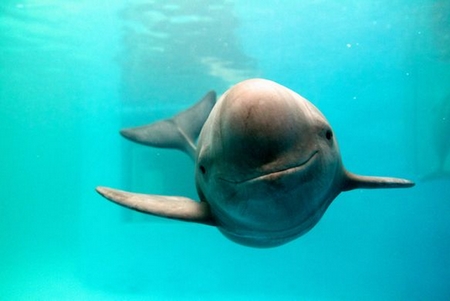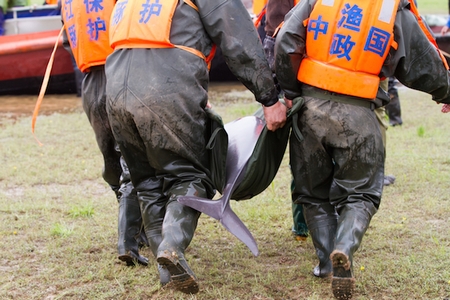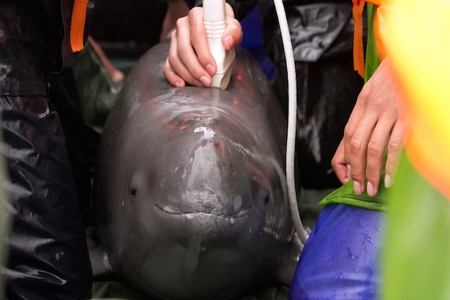
Newsroom
The Reason This Unique and Critically Endangered Porpoise Is Smiling
China’s Yangtze finless porpoise has a new chance at survival thanks to a team of conservationists and a couple of trucks.
 |
|
(Photo: Kent Truog/WWF) |
Eight years ago, the Chinese river dolphin known as the baiji was declared extinct for practical purposes. Conservationists are now determined to avoid a repeat of that tragedy with a similar species, the Yangtze finless porpoise.
They were once plentiful, but today only about 1,000 of these adorable cetaceans remain, mostly in the heavily polluted and trafficked river for which they are named. That number, meanwhile, is rapidly dropping. Scientists estimate that more than 13 percent of the remaining porpoises die every year—up from 6.4 percent in 2011—and fear that the species faces extinction in less than a decade.
That’s why today is a banner day for the Yangtze finless porpoise. Early on March 27, as the sun rose in China, four of the animals completed a 250-mile drive to a new home that could spell salvation for the species—or at least give it some hope.
 |
|
(Photo: Kent Truog/WWF) |
Eight porpoises were captured earlier this month in Poyang Lake in eastern China, which holds about half of the species’ population. A process called “acoustic drive netting” was used: The animals were slowly guided into smaller and smaller areas between boats and sandbars until they could be carefully caught with nets designed to protect their fins. Eight years ago, the Chinese river dolphin known as the baiji was declared extinct for practical purposes. Conservationists are now determined to avoid a repeat of that tragedy with a similar species, the Yangtze finless porpoise.
“The whole process is supposed to avoid direct contact and minimize the chance of injury,” said Zhang Xinqiao, senior officer for WWF-China’s finless porpoise project, who was part of the working team handling the capture and relocation.
Equal care was taken on the long journey. The porpoises were kept in tanks on hammocks; their bodies were about 60 percent submerged to relieve the pressure their weight would create on their internal organs. The truck drivers made sure to avoid any unnecessary braking to reduce stress on the porpoises.
Once they arrived, it was time for a massage and a small meal. “After a long-distance transportation, muscle rigidity might happen to the porpoises and weaken their swimming capacity,” Zhang said.
 |
|
(Photo: Kent Truog/WWF) |
This morning, the first four porpoises were released into the He-wang-miao/Ji-cheng-yuan oxbow (a U-shaped lake), where it’s hoped they will breed and start a new population. The lake is home to 34 fish species, and commercial fishing has just been banned in a big portion of the lake, so there should be plenty for the new residents to eat.
“Lack of food is one of the biggest threats to finless porpoises,” Zhang said.
The remaining four will be released a few days from now into the nearby Tian-e-zhou oxbow, which already has 45 finless porpoises. These new additions will help to improve the genetic diversity of the population there.
While all of this is going on, WWF and local environmental organizations are working to improve conditions for Yangtze finless porpoises in their other habitats.
The biggest success so far is at Dongting Lake, which holds about 100 porpoises. New regulations have helped to eliminate the threat of illegal fishing there, and as a result, Zhang said, the number of fish available to the porpoises has increased fivefold since 2012.
This is just the beginning. Tian-e-zhou now has just about all of the porpoises that it can hold, so four animals from the original population will join the new group at He-wang-miao/Ji-cheng-yuan later this year. Another four will make the journey in 2017. The working group, which is led by China’s Ministry of Agriculture, hopes the two sites will eventually hold a combined 100 porpoises.
That might be enough to keep this critically endangered species smiling for generations to come.
(Takepart)